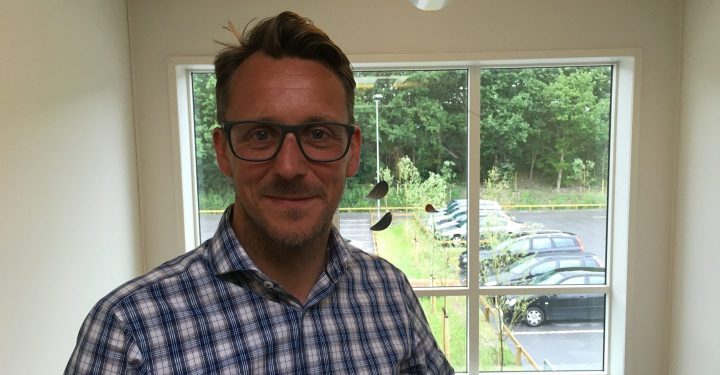Mød psykologen, datanørden og forbedringsildsjælen: Simon Tulloch. Han har taget turen fra East London NHS Foundation Trust til Dansk Selskab for Patientsikkerhed, som står bag Sikker Psykiatri sammen med Danske Regioner, TrygFonden og Det Obelske Familiefond. I Sikker Psykiatri skal han bistå projektleder Simon Feldbæk Peitersen.
What did you work with at East London NHS Foundation Trust?
I started working for East London in 2008. I initially started in a research and innovation role; 80 % undertaking research with one of the academic partners – Queen Mary University – Unit for Social & Community Psychiatry – and 20 % working with clinical and management teams trying to implement the findings from the research into clinical practice. For example to reduce the 17 years time-lag from research to practice.
Increasingly, my role became less focused on research and more on ‘quality’, initially aligned to the old model of assurance and performance, and then in the last four years using the Model for Improvement as we also use in Sikker Psykiatri. Most recently my title was Head of Quality Outcomes and Experience for East London NHS Foundation Trust. It meant that I was responsible for developing and managing systems to support high quality care and treatment across the organisation.
Much of the emphasis was on the collection and use of clinical and experience data. This involved working closely with clinicians, corporate teams, patients and external stakeholders such as commissioners (the people who pay for the services). In the Quality Improvement faculty I helped to develop the strategic components of the quality program, coach a number of projects across the organisation and teach the Model for Improvement to staff.
What have East London achieved?
In the last four years East London NHS Foundation Trust have adopted and embraced the Model for Improvement as a means of working across all elements of the organisation. This required significant investment; in time, resources and structure.
By working closely with the Institute for Healthcare Improvement – as we also do in Sikker Psykiatri – East London created a clear mission to be the best provider of mental health and community care in England by 2020. They developed a clear plan in the form of a driver diagram – as we use in Sikker Psykiatri – and have worked hard to ensure the organisation has followed this plan.
East London NHS Foundation Trust have worked closely with many organisations, not least Dansk Selskab for Patientsikkerhed. These partnerships have been invaluable in developing a culture of shared learning and transparency.
What learning from East London could be transferable to Denmark?
I think there are three things which may be most relevant. First East London spent time building the will across the organisation, for example making the case for using the Model for Improvement, holding launch events, celebrate successes.
Second East London invested heavily in increasing improvement capability, for example proving training to as many staff as possible. This has the benefit of ensuring the language and tools used in Quality Improvement work are known to as many people as possible.
Third East London have aligned systems and structures to ensure Quality Improvement is ‘work as usual’ and not a project that is done for an hour once a week. This is relevant for all aspects of the organisation, from the board room to canteen.
What are the challenges of using Quality Improvement in Denmark?
It’s very early days, I only started in June, however, from the visits and conversations I’ve had so far it seems that for many people, Quality Improvement is quite new – and so there may be an element of suspicion about what it is and why it’s important. I think part of our role at Dansk Selskab for Patientsikkerhed is to provide assurance and build confidence.
Quality Improvement has been around for many years and is based on an understanding of the systems in which we function, the complexity of dealing with people, the variation of outcomes created by the system and the use of knowledge to influence those outcomes. Therefore, I think we are ambassadors responsible for helping to build a culture of continuous Quality Improvement in the organisation we work with.



